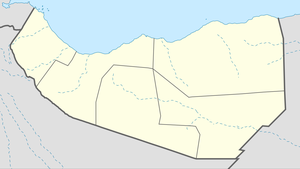Baligubadle
Baligubadle is a town in southern Maroodi Jeex region of Somaliland.[1] The locality serves as the capital of the Hawd Region, an administrative subdivision of the Republic of Somaliland that was created in 2008. The town is considered to be pastoral whereby the local economy is predominantly dependent on the livestock trade, however small-scale rain fed farming is also practiced [2].
Baligubadle | |
|---|---|
Town | |
 Baligubadle | |
| Coordinates: 9°00′20.5″N 44°00′03.5″E | |
| Country | |
| Time zone | UTC+3 (EAT) |
History
The town of Baligubadle served as the administrative headquarters of the SNM [3] and played a crucial role in the formation of modern-day Somaliland.In March 1990, Baligubadle hosted the sixth Somali National Movement congress whereby the role of the House of Elders (Somaliland) was formally institutionalized under Article 4 of the Somali National Movement constitution [4].
Additionally, the constitution of the Somali National Movement was adopted at the organisation's sixth congress in the town in 1990 [5]. Therefore, paving way for the future administration to govern for two years [5].
Governance
A local council made up of 13 elected officials are responsible for the provision of water, education, health, electricity, and sanitation in the town [6]. Councillors were first elected in 2001 and subsequently in 2012 [6], continued decentralised processes has empowered the local council in effectively serving its populations needs.
Education
The "Farah Nour" secondary school serves the local population and as a public school, is supported by the Ministry of Education and Science (Somaliland) [7] .
Notes
- Somaliland’s Quest for International Recognition and the HBM-SSC Factor Archived May 28, 2012, at the Wayback Machine
- Ismail, Dr. Adam (May 2016). "An Analysis Of Women's Land Rights & Territorial Rights Of Somali Minorities In Somaliland" (PDF). SCOTRA.
- Connaughton, Stacey L.; Berns, Jessica (2019-09-09). Locally Led Peacebuilding: Global Case Studies. Rowman & Littlefield. ISBN 978-1-5381-1411-7.
- "After Borama: Consensus, representation and parliament in Somaliland". www.africaresearchinstitute.org. Retrieved 2020-02-29.
- Project, War-torn Societies; Programme, WSP Transition (2005). Rebuilding Somaliland: issues and possibilities. Red Sea Press. ISBN 978-1-56902-229-0.
- Baligubade District Conflict and Security Assessment (PDF). Hargeisa, Somaliland: The Observatory of Conflict and Violence Prevention. 2015.
- "Survey of Secondary Education in Somaliland 2008" (PDF). unesdoc.unesco.org. Retrieved 2020-06-28.
References
- Walter Dostal, Wolfgang Kraus, Shattering tradition: custom, law and the individual in the Muslim Mediterranean, (I.B.Tauris: 2005), p. 313.
- African Defence Journal, Issues 78–88, (The Journal: 1987), p. 22.